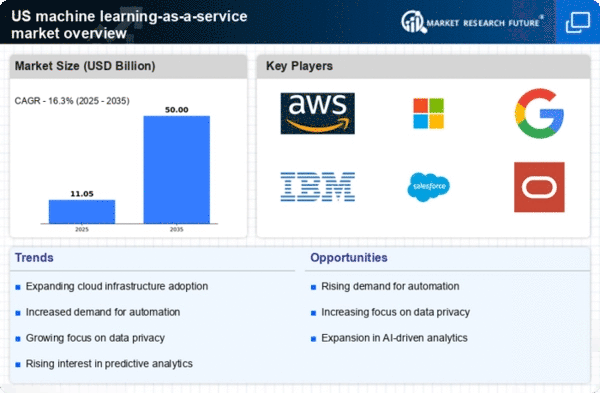Growing Demand for Predictive Analytics
There is a notable surge in demand for predictive analytics in the machine learning-as-a-service market. Organizations across various sectors are increasingly recognizing the value of leveraging data to forecast trends and behaviors. This shift is driven by the need for data-driven decision-making, which enhances operational efficiency and customer satisfaction. According to recent estimates, the predictive analytics segment is projected to grow at a CAGR of approximately 25% through 2026. This growth indicates a robust appetite for machine learning solutions that can provide actionable insights. As businesses strive to remain competitive, the integration of predictive analytics into their operations is becoming essential, thereby propelling the machine learning-as-a-service market forward.
Expansion of Data Generation and Collection
The exponential growth of data generation and collection is a pivotal factor influencing the machine learning-as-a-service market. With the proliferation of IoT devices, social media, and digital transactions, organizations are inundated with vast amounts of data. This data, if harnessed effectively, can provide valuable insights and drive strategic decision-making. It is estimated that by 2025, It is estimated that the total amount of data created globally will reach 175 zettabytes. This surge in data necessitates advanced machine learning solutions to analyze and interpret information efficiently. Consequently, the machine learning-as-a-service market is likely to benefit from this trend, as businesses seek to leverage data for competitive advantage.
Rising Need for Automation in Business Processes
The push for automation in business processes is a critical driver of the machine learning-as-a-service market. Organizations are increasingly adopting automated solutions to enhance productivity and reduce operational costs. Machine learning technologies facilitate the automation of repetitive tasks, allowing employees to focus on more strategic initiatives. Reports suggest that automation can lead to a productivity increase of up to 40% in certain sectors. As businesses recognize the potential of machine learning to streamline operations, the demand for machine learning-as-a-service solutions is expected to rise, further solidifying its position in the market.
Increased Focus on Customer Experience Enhancement
Enhancing customer experience is becoming a primary objective for many organizations, thereby driving the machine learning-as-a-service market. Companies are utilizing machine learning to analyze customer behavior, preferences, and feedback, enabling them to tailor their offerings accordingly. This focus on personalization is expected to improve customer satisfaction and loyalty. Research indicates that businesses that prioritize customer experience can achieve revenue growth of up to 10% annually. As organizations strive to create more engaging and personalized interactions, the demand for machine learning-as-a-service solutions that facilitate these enhancements is likely to grow, further propelling the market.
Advancements in Artificial Intelligence Technologies
Technological advancements in artificial intelligence (AI) are significantly influencing the machine learning-as-a-service market. Innovations in algorithms, computing power, and data processing capabilities are enabling more sophisticated machine learning models. These advancements allow organizations to harness complex data sets and derive insights that were previously unattainable. The AI sector is expected to reach a valuation of $190 billion by 2025, indicating a strong correlation with the growth of machine learning services. As companies seek to implement AI-driven solutions, the demand for machine learning-as-a-service offerings is likely to increase, fostering a competitive landscape that encourages continuous innovation.

















